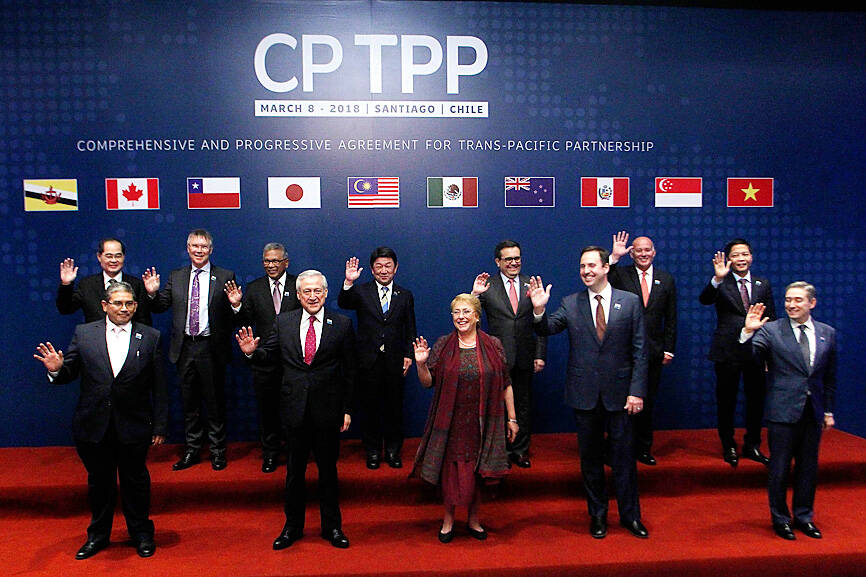The Ministry of Foreign Affairs (MOFA) has drawn up action plans for next year to push Taiwan’s bid to join the Comprehensive and Progressive Agreement for Trans-Pacific Partnership (CPTPP), a foreign affairs official said yesterday.
Canada is to host next year’s CPTPP meeting, presenting a “window of opportunity” for Taiwan to pursue the bid, Department of International Cooperation and Economic Affairs Director-General Vivian Lien (連玉蘋) told the Legislative Yuan.
Taiwan is to establish unofficial communication channels next year to hold consultations with CPTPP member states, which is the first step before the CPTPP Commission sets up a working group to negotiate the accession request, she said.

Photo: AFP
The nation is also to form communication missions to some of the member states that are opinion leaders — such as Japan, Canada, New Zealand, Australia and the UK — to formulate models and narratives that are conducive to Taiwan’s participation in the bloc, she said.
For countries that are unsupportive of Taiwan’s bid, the nation is to continue to communicate with them through chambers of commerce, think tanks, academia and the industry, she added.
Meanwhile, Minister Without Portfolio John Deng (鄧振中) in charge of economic and trade negotiations, on Sunday said that principal aim of the Taiwanese delegation to this year’s APEC forum is to build up support for Taiwan’s CPTPP participation.
Deng, who is part of the Taiwanese delegation that is attending the APEC summit in San Francisco, which opened on Saturday last week and runs until Friday, said that the forum should be an important opportunity for Taiwanese delegates to meet representatives from CPTPP member countries.
The Taiwanese delegation is aiming to hold as many bilateral meetings as possible to express Taiwan’s strong desire to join the CPTPP and brief member states about the preparatory efforts the country has been making.
The CPTPP, which grew out of the Trans-Pacific Partnership that the US left in January 2017, is one of the world’s biggest trade blocs, representing a market of 500 million people and accounting for 13.5 percent of global trade.
Its 11 signatories are Australia, Brunei, Canada, Chile, Japan, Malaysia, Mexico, New Zealand, Peru, Singapore and Vietnam.
The UK formally signed the trade agreement on July 16 and is to join when its accession is ratified by all parties.
Taiwan submitted its application to join the CPTPP on Sept. 22, 2021, less than a week after China also applied for membership.

MAKING WAVES: China’s maritime militia could become a nontraditional threat in war, clogging up shipping lanes to prevent US or Japanese intervention, a report said About 1,900 Chinese ships flying flags of convenience and fishing vessels that participated in China’s military exercises around Taiwan last month and in January last year have been listed for monitoring, Coast Guard Administration (CGA) Deputy Director-General Hsieh Ching-chin (謝慶欽) said yesterday. Following amendments to the Commercial Port Act (商港法) and the Law of Ships (船舶法) last month, the CGA can designate possible berthing areas or deny ports of call for vessels suspected of loitering around areas where undersea cables can be accessed, Oceans Affairs Council Minister Kuan Bi-ling (管碧玲) said. The list of suspected ships, originally 300, had risen to about

DAREDEVIL: Honnold said it had always been a dream of his to climb Taipei 101, while a Netflix producer said the skyscraper was ‘a real icon of this country’ US climber Alex Honnold yesterday took on Taiwan’s tallest building, becoming the first person to scale Taipei 101 without a rope, harness or safety net. Hundreds of spectators gathered at the base of the 101-story skyscraper to watch Honnold, 40, embark on his daredevil feat, which was also broadcast live on Netflix. Dressed in a red T-shirt and yellow custom-made climbing shoes, Honnold swiftly moved up the southeast face of the glass and steel building. At one point, he stepped onto a platform midway up to wave down at fans and onlookers who were taking photos. People watching from inside

Japan’s strategic alliance with the US would collapse if Tokyo were to turn away from a conflict in Taiwan, Japanese Prime Minister Sanae Takaichi said yesterday, but distanced herself from previous comments that suggested a possible military response in such an event. Takaichi expressed her latest views on a nationally broadcast TV program late on Monday, where an opposition party leader criticized her for igniting tensions with China with the earlier remarks. Ties between Japan and China have sunk to the worst level in years after Takaichi said in November that a hypothetical Chinese attack on Taiwan could bring about a Japanese

STREAMLINED: The dedicated funding would allow the US to transfer equipment to Taiwan when needed and order upgraded replacements for stockpiles, a source said The US House of Representatives on Thursday passed a defense appropriations bill totaling US$838.7 billion, of which US$1 billion is to be allocated to reinforcing security cooperation with Taiwan and US$150 million to replace defense articles provided to the nation. These are part of the Consolidated Appropriation Act, which the US House yesterday passed with 341 votes in favor and 88 against. The act must be passed by the US Senate before Friday next week to avoid another government shutdown. The US House Committee on Appropriations on Monday unveiled the act, saying that it allocates US$1 billion for the Taiwan Security Cooperation Initiative